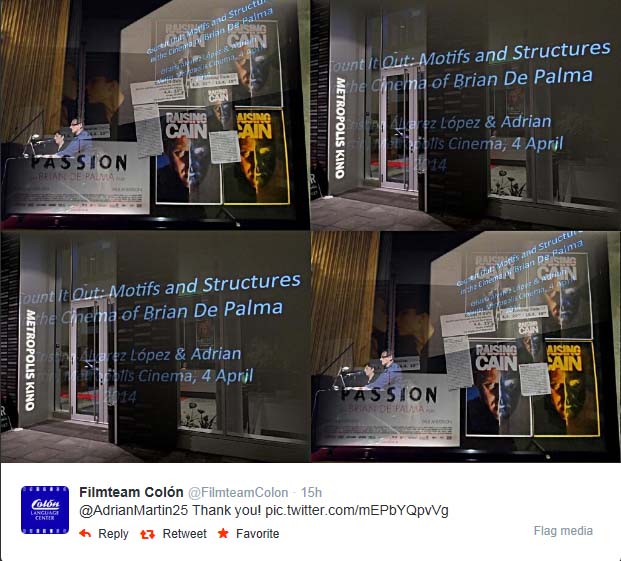

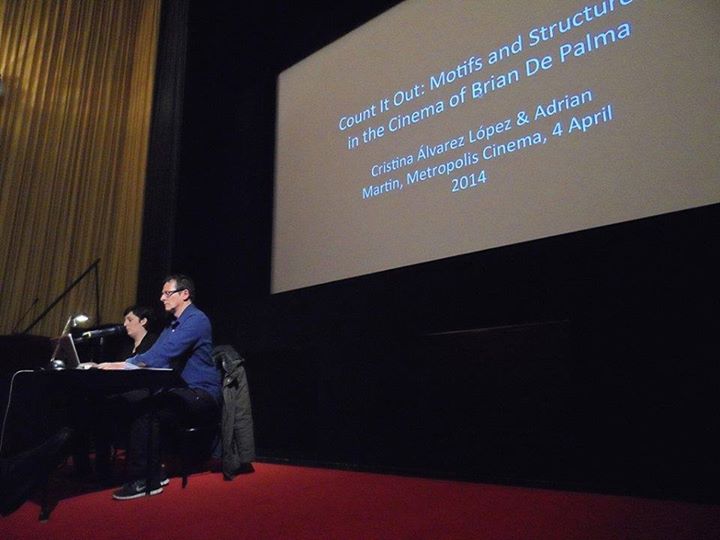
Updated: Saturday, April 5, 2014 10:54 PM CDT
Post Comment | Permalink | Share This Post
 Hello and welcome to the unofficial Brian De Palma website. Here is the latest news: |
|---|
E-mail
Geoffsongs@aol.com
-------------
Recent Headlines
a la Mod:
Listen to
Donaggio's full score
for Domino online
De Palma/Lehman
rapport at work
in Snakes
De Palma/Lehman
next novel is Terry
De Palma developing
Catch And Kill,
"a horror movie
based on real things
that have happened
in the news"
Supercut video
of De Palma's films
edited by Carl Rodrigue
Washington Post
review of Keesey book
-------------
Exclusive Passion
Interviews:
Brian De Palma
Karoline Herfurth
Leila Rozario
------------
------------
| « | April 2014 | » | ||||
| S | M | T | W | T | F | S |
| 1 | 2 | 3 | 4 | 5 | ||
| 6 | 7 | 8 | 9 | 10 | 11 | 12 |
| 13 | 14 | 15 | 16 | 17 | 18 | 19 |
| 20 | 21 | 22 | 23 | 24 | 25 | 26 |
| 27 | 28 | 29 | 30 | |||
De Palma interviewed
in Paris 2002
De Palma discusses
The Black Dahlia 2006

Enthusiasms...
Alfred Hitchcock
The Master Of Suspense
Sergio Leone
and the Infield
Fly Rule
The Filmmaker Who
Came In From The Cold
Jim Emerson on
Greetings & Hi, Mom!
Scarface: Make Way
For The Bad Guy
Deborah Shelton
Official Web Site
Welcome to the
Offices of Death Records



 Earlier today, on its Facebook page, Scream Factory posted this shot of Brian De Palma, along with a message that reads, in part, "We're thrilled to share with you PHANTOM OF THE PARADISE fans that we just finished shooting an all-new interview with legendary Director Brian De Palma!" As previously announced, the Blu-Ray package will be released August 5th. The Facebook post adds that this new interview is "just scratching the surface! We have LOTS of extras planned for the release and will be announcing them all early June."
Earlier today, on its Facebook page, Scream Factory posted this shot of Brian De Palma, along with a message that reads, in part, "We're thrilled to share with you PHANTOM OF THE PARADISE fans that we just finished shooting an all-new interview with legendary Director Brian De Palma!" As previously announced, the Blu-Ray package will be released August 5th. The Facebook post adds that this new interview is "just scratching the surface! We have LOTS of extras planned for the release and will be announcing them all early June."
Captain America co-screenwriter Stephen McFeely tells Superhero Hype's Edward Douglas how the film's directors, Anthony and Joe Russo, applied other inspirations to the movie, leaving the impression that the elevator scene, at least in part, was perhaps directly influenced by De Palma. "The very first draft of the screenplay looks a lot like the movie," McFeely tells Douglas. "That said, the Russos came in and had all the same and even better touchstones than what we were talking about. They came in and would say, "This feels like a William Friedkin section, feels like a Brian De Palma section," so like that elevator scene was something not quite as interesting as that elevator scene but the Russos came in and went, "Why don't we do this tense built-up elevator thing" and it was all very exciting the whole time we were working on the second draft with them. Chris and I would talk to each other and say, "They're talking a great game. If they can do what they say they want to do, this will be great," and then we had no idea whether the guys from TV would be able to do this. In a way, it was a really great mesh of that they really got the material and they elevated it. It was a real pleasure.
In an interview with Mother Jones' Asawin Suebsaeng, the Russo brothers talk about how the film was influenced by Sydney Pollack's Three Days Of The Condor, itself a film that heavily influenced De Palma, particularly on Mission: Impossible. They also mention several other movie influences, as well as how their film reflects current political anxieties. Here is an excerpt from the Mother Jones article:
"[That film] was a big influence on this movie," Joe says. "You could really call this movie 'Three Days of Captain America,' if you wanted to. The structure is so similar...We felt like we had a decent shot at getting [Redford] because the script had a political component to it and we thought that might motivate him."
But don't take any of this to mean the film is a stern lecture on American foreign policy. It's thrilling as hell, and also the best to emerge in the recent string of Marvel movies. "We're action fetishists," Joe says. "And we love '70s thrillers." The brothers drew on the influence of some of their favorite action-flick moments: The famous bank heist and shootout in Michael Mann's Heat. William Friedkin's The French Connection. John Schlesinger's Marathon Man. John McTiernan's Predator. Gareth Evans' The Raid: Redemption. (And for the Washington, DC-set car chase in The Winter Soldier, the brothers consulted YouTube, searching for videos of actual car chases. One video—wherein two escaped convicts in Brazil get stuck in traffic and plow through cars as police pursue them on foot—was especially helpful.) "Choreographing action, it's like choreographing a Broadway show," Anthony says.
But at the heart of the explosion and melee -filled film are the political themes, including targeted killing. "The question is where do you stop?" Joe says. "If there are 100 people we can kill to make us safer, do we do it? What if we find out there's 1,000? What if we find out there's 10,000? What if it's a million? At what point do you stop?"
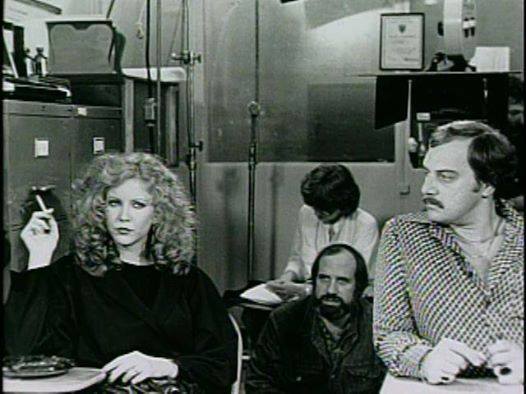
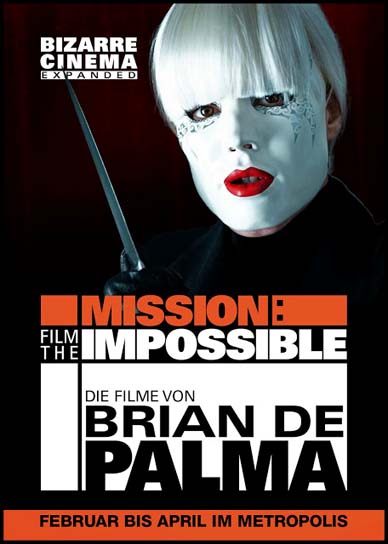 Metropolis Kino in Hamburg, Germany, has been running a fairly thorough Brian De Palma retrospective since February. It continues through April, and includes a screening of De Palma's Passion this Friday, which will be introduced by Adrian Martin and Cristina Álvarez López, who also happen to be working together on a new book about De Palma. (The pair wrote a wonderful piece about Passion for L O L A last September.)
Metropolis Kino in Hamburg, Germany, has been running a fairly thorough Brian De Palma retrospective since February. It continues through April, and includes a screening of De Palma's Passion this Friday, which will be introduced by Adrian Martin and Cristina Álvarez López, who also happen to be working together on a new book about De Palma. (The pair wrote a wonderful piece about Passion for L O L A last September.)
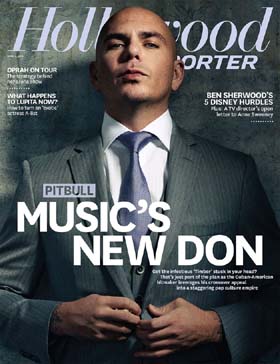 In Shirley Halperin's cover story for this week's Hollywood Reporter, rapper Pitbull discusses how Scarface influenced him in his teenage years. The message he took away from the film seems unique in the hip-hop milieu. Here's an excerpt from the article:
In Shirley Halperin's cover story for this week's Hollywood Reporter, rapper Pitbull discusses how Scarface influenced him in his teenage years. The message he took away from the film seems unique in the hip-hop milieu. Here's an excerpt from the article:Pit's father and namesake, known in the neighborhood as a charismatic street hustler, often would take his son to the local bars, where the boy would first perform for an audience, reciting Cuban poetry from a bar stool as his father looked on proudly. Pit's parents divorced in 1985.
Bring up the Brian De Palma classic -- not universally beloved in Miami for the cultural stereotypes it spawned -- and Pitbull takes no umbrage. "We all have Scarfaces in our family," he says matter-of-factly. "[The movie] is the truth. It wasn't exaggerated. Scorsese, Oliver Stone, De Palma -- those guys were right on the money." Pitbull says he's seen it too many times to count and that a serious message sunk in: that he didn't want to end up like the protagonist Tony Montana. Rather, says Pit: "I wanted to be Sosa -- educated, good-looking, a good dresser, and he's the one who was running it. And notice, he never got his hands dirty. He sipped his tea. He was nice, not aggressive. And at the end of it all, he was the one that stayed. So I realized around 18 that Tony's the wrong guy to be looking up to."
What Pitbull learned from his immediate surroundings, besides how to sell drugs, which he did for a while, was the skill of connecting with people. That's his most powerful gift -- winning loyalty of everyone he encounters, from strangers on the street to dealmakers in a boardroom. He does this, in part, with a relentlessly upbeat attitude. Pitbull explains his six-year rise to the top in the exuberant idiom of a motivational speaker: "2009 is freedom; 2010, invasion; 2011, build empire; 2012, grow wealth; 2013, put the puzzle together; 2014, buckle up; 2015, make history." It's a mantra he shares with manager Charles Chavez, who says his goal is for Pitbull to become a billion-dollar enterprise. "We have a plan -- with the music, TV projects [Pit boasts a development deal with Endemol, producer of Big Brother], films [he's teamed up with Ryan Seacrest for a TV miniseries on the Bacardi family], his businesses, the brands that we get involved with," says Chavez. "You never know, but it's the plan."
Pitbull is more confident, even willing to time-stamp the future threshold. "Do I think it's realistic to be a billion-dollar company by [age] 35? Absolutely."
Lithgow tells Moret, "You're in a strange sort of isolation booth when you're acting in a film. You don't really have a sense of all the things going on around you. You only really see it when you see the whole film." [Al Pacino said something very similar about working on Carlito's Way. Seeing what the camera was doing while watching dailies, he would say, "Whoa, something's going on there."]
"One thing that really limits you as an actor," Lithgow tells Moret, "is to worry too much about whether you're likeable or not. Actors who worry about how they're coming off, how they look, whether they're sympathetic, those actors are really attaching shackles to their ankles."
Moret follows up, "Well, if not liking them, then what about understanding this person?"
Lithgow: "Yeah, that's what you try to do. You try to understand him, and trace the motives."
Moret: "Do you look to Brian to pull in the reins, so that you don't give a performance that's almost over the top?"
Lithgow: "Yeah, he modulates it. And chases me when I'm too... doing too much, and edits my acting."
After another clip from the film, Lithgow says, "People who see this movie, you know, the questions I've been asked, so many people say, 'God, wasn't it difficult?' Difficult parts to play are the ones where there isn't enough to do. This one was just so much fun. Playing this part is the kind of thing you became an actor hoping to be able to do."
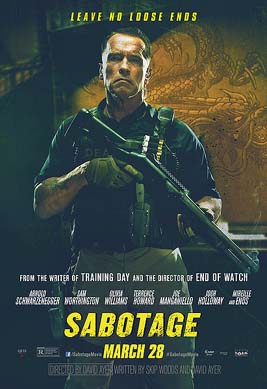 Alonso Duralde, The Wrap:
Alonso Duralde, The Wrap:"Arnold Schwarzenegger has defended 'brutal violence' in movies ahead of his new film Sabotage, in which the 66-year-old plays the head of a special unit of the US Drug Enforcement Administration (DEA) whose members are viciously killed and mutilated after a cartel bust.
"Schwarzenegger, the former Governor of California, said: 'It's a bit of an homage to the films that I grew up on, and directors like Brian De Palma, and Walter Hill and Sam Peckinpah who made very brutal kind of masculine movies. I think violence is political now: "maybe if there is no violence in movies, there will be no violence in the world." I don't believe that. The video games our children play are much, much more violent than anything in this movie.'"
"The results are deliberately off-putting, a nasty film about mean people doing horrible things. That’s surely by design. Ayer is trying to paint a broad portrait of the poisonous effect this never-ending conflict has on its combatants, and to make a movie that mirrors its protagonists’ fractured psyches. Like Wharton’s DEA unit, Sabotage gets off on the adrenaline rush of badass brutality—but feels traumatized by its aftermath.
"That jibes perfectly with late-career Schwarzenegger’s onscreen persona, the man overwhelmed with grief and regret. Action heroes have rarely killed more people onscreen than Ahnuld—or done so while completely dismissing the emotional weight of those killings by delivering shamelessly goofy puns while committing murder. But as viewers slowly realize over the course of the film, John Wharton has witnessed the effect of violence first-hand, and it’s scarred him. That almost makes Sabotage Schwarzenegger’s (much less effective) version of Clint Eastwood’s Unforgiven—his chance to wrestle with all the death he’s perpetrated onscreen, and to consider, once and for all in his twilight years, whether it was really worth it. The film’s final scene—one of the most fascinating of Schwarzenegger’s entire career—makes the Eastwood comparison even more overt, turning Wharton into something of a Western cowboy."